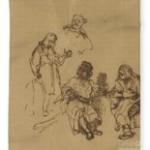 In 1960 D. W. Winnicott published what appeared to be an inconsequential article describing “the false self.” Winnicott argued that, in self-defense, we all build versions of ourselves. Those “false selves” are designed to offer a version of ourselves to the world that keep us from being hurt and promote public civility, ordering our impulses and the ways in which we act on them. Winnicott argued that in those who are emotionally troubled, the false self looms so large that the “true self” is hidden from view.
In 1960 D. W. Winnicott published what appeared to be an inconsequential article describing “the false self.” Winnicott argued that, in self-defense, we all build versions of ourselves. Those “false selves” are designed to offer a version of ourselves to the world that keep us from being hurt and promote public civility, ordering our impulses and the ways in which we act on them. Winnicott argued that in those who are emotionally troubled, the false self looms so large that the “true self” is hidden from view.
Writer Brennan Manning uses this concept to good effect to describe the difficulty he faced in acknowledging his alcoholism. He was so attached to his image as a priest, that it took a long time to admit that he was seriously addicted. Then, when he became sober, he became overly attached to the false self that was his image as a priest who was willing to acknowledge his addiction. As Manning describes it, the spiritual progress he has made toward ever greater intimacy with God has depended upon his ability to live as “his true self” in God’s presence.
Manning’s work is and has been profoundly helpful, and others have made similar arguments that have proven equally helpful. (See, for example, the work of Richard Rohr.) But from the vantage point of spiritual direction — the reality of our evolving spiritual selves can be far more complicated that this one application might suggest.
For one thing, the alternative or formal images that we use to protect ourselves serve a legitimate purpose, even into adult life. Not everyone we meet can be trusted with “our true selves” and it is a mistake to assume that anyone and everyone can be trusted in that fashion. People who lie, keep secrets, or who use what they know about us to harm, injure, or manipulate us should not be trusted and there is nothing about the Christian faith that requires that kind of trust. As the Scots observe, “Fool me once, shame on you. Fool me twice, shame on me.”
Two, “false selves” are not always false and they are not just about self-protection. They can also be about aspirations. Longing to be something that reflects a life’s vocation or holy ambition is not a bad thing in and of itself. Dealing with those images as if they were simply destructive or misleading is a mistake. Years ago a directee told me he liked being a Christian because it was a place where you could live into being a failure. That is a strange perversion of the Gospel. Grace is not given to us so that we can fail with impunity. It is given to us so that we can be remade in the image of God.
Three, what we are meant to be is a journey into God. The process of discovering what it means to be a child of God is not a matter of embracing a fixed reality. It is about growth and experience — a journey into that sacred childhood. We can “lose ourselves” along the way, by acting with a lack of integrity or by betraying our values. But our true selves is not just something that exists whole cloth, out there. It lies ahead as we live into ever greater intimacy with God.
So how do we evaluate the competing definitions of who we are that offer themselves along the way?
- Remember that we are on our way into that gift which is childhood in God.
- Some of what we embrace along the way nurtures that journey and other things do not.
- Understandings of our lives that draw us closer to God can be useful, even critical to that journey, if they do not become a substitute for standing before God in vulnerable honesty and transparency.
- Any understanding of ourselves that becomes a substitute for that journey, or masks some part of ourselves from God is spiritually problematic.
- The problem may lie in the image itself, in that it is foreign to God’s purposes — in those cases it is important to abandon that image as quickly as possible.
- If the image is not alien to the purposes of God, the problem may be attachment: Images that invite what an older generation called “holy ambition” can contribute to spiritual growth if we acknowledge that they are ours to receive, not control.
Above all, it is important to remember: The most important questions in life are not about what we should do. They are about becoming.












